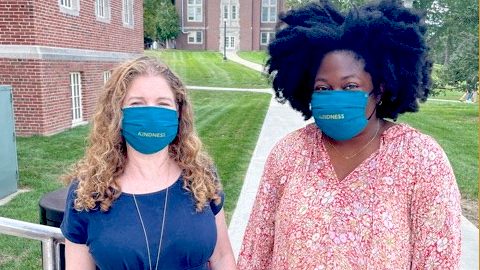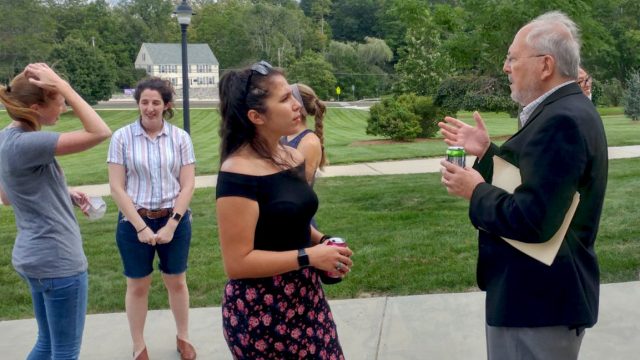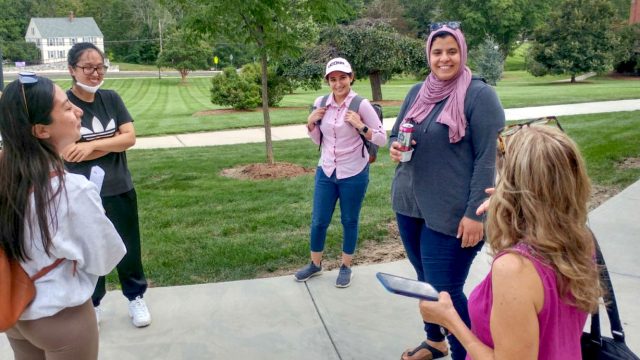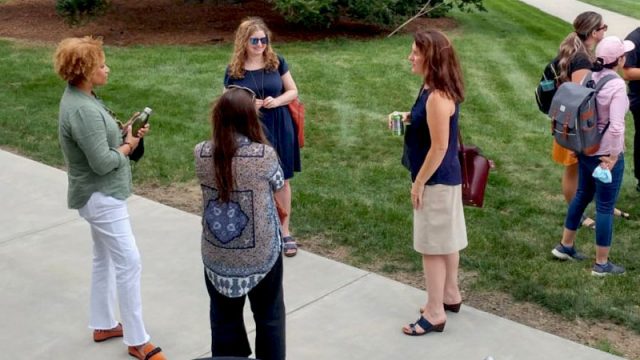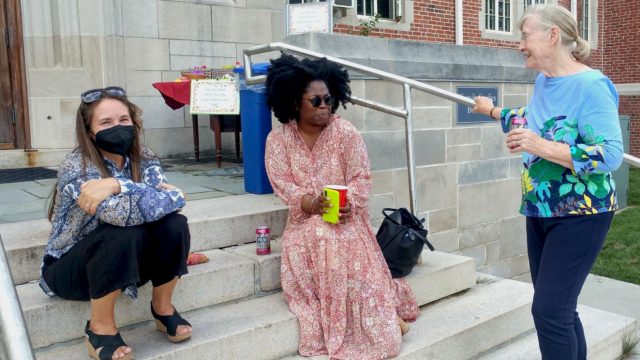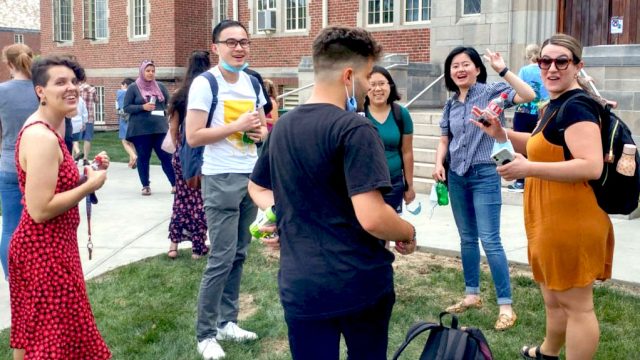Faculty, staff, and grad students were excited to see each other in person – socially distanced outside – at a gathering to celebrate the start of the new year.
Author: Janice Berriault
Rachael Farina accepted as mentor to NCFR Mentoring Academy
 Gradate student Rachael Farina was accepted as a mentor to the NCFR Mentoring Academy
Gradate student Rachael Farina was accepted as a mentor to the NCFR Mentoring Academy
Marlene Schwartz featured in FoodNavigator-USA article
 Professor Marlene Schwartz featured in an article on high rates of sugary drink consumption among Black and Hispanic students. Read the article here.
Professor Marlene Schwartz featured in an article on high rates of sugary drink consumption among Black and Hispanic students. Read the article here.
Ryan Watson and team receive NIH supplement award
 Associate Professor Ryan Watson is part of a team that received a $620,000 NIH supplement award to launch a follow up national survey of LGBTQ teens.
Associate Professor Ryan Watson is part of a team that received a $620,000 NIH supplement award to launch a follow up national survey of LGBTQ teens.
Linda Halgunseth now has a joint appointment with El Instituto
 Associate Professor Linda Halgunseth now has a joint appointment with El Instituto. As part of this position, Linda will teach courses for both HDFS and El Instituto, and is working with CETL to develop a course on Latinx families. We are excited about the opportunities that this joint position will provide the department for more collaboration between HDFS and El Instituto. It is also a great opportunity for the Hartford campus to have increased course offerings in LLAS.
Associate Professor Linda Halgunseth now has a joint appointment with El Instituto. As part of this position, Linda will teach courses for both HDFS and El Instituto, and is working with CETL to develop a course on Latinx families. We are excited about the opportunities that this joint position will provide the department for more collaboration between HDFS and El Instituto. It is also a great opportunity for the Hartford campus to have increased course offerings in LLAS.
Jodie Oshana, HDFS Faculty Spotlight September 2021
Visiting Assistant Professor
 Jodie is a graduate of UConn with a PhD in Human Development and Family Sciences. She also holds a law degree from Quinnipiac University School of Law. Jodie has worked at UConn for the past 12 years, teaching at the Storrs, Hartford, and Waterbury campuses. She has taught numerous HDFS courses, with her favorite the policy courses. She also developed and teaches two new courses at Quinnipiac University School of Law. One of the courses is a seminar that introduces law students to the use of social science research in the context of family/juvenile courts, including understanding social science research methods, an intensive examination of child and adolescent development research findings, and effective application of such research in legal settings. The other course examines the problem of racial disproportionality and disparate outcomes in the child welfare and juvenile justice systems.
Jodie is a graduate of UConn with a PhD in Human Development and Family Sciences. She also holds a law degree from Quinnipiac University School of Law. Jodie has worked at UConn for the past 12 years, teaching at the Storrs, Hartford, and Waterbury campuses. She has taught numerous HDFS courses, with her favorite the policy courses. She also developed and teaches two new courses at Quinnipiac University School of Law. One of the courses is a seminar that introduces law students to the use of social science research in the context of family/juvenile courts, including understanding social science research methods, an intensive examination of child and adolescent development research findings, and effective application of such research in legal settings. The other course examines the problem of racial disproportionality and disparate outcomes in the child welfare and juvenile justice systems.
In addition to her teaching experience, Jodie was a practicing attorney for ten years primarily in the areas of family and juvenile law. She worked at the Children’s Law Center of Connecticut as an advocate for children of low-income and high-conflict families in the family courts. She also worked at a private law firm representing clients in all matters including family law, juvenile law, and elder law. Although she prioritized alternative dispute resolution methods such as mediation, Jodie litigated numerous custody and divorce trials. In the classroom, Jodie frequently uses examples and stories from her years as a lawyer to bring various course concepts to life for students.
Jodie’s research interests lie at the intersection of social policy, law, and children/families. Jodie’s previous research has focused on the effectiveness of standards in the family and juvenile courts, including the standards for Guardians ad Litem and the best interest of the child standard. She has presented her research at various national conferences and is frequently an invited speaker at local conferences and trainings including the State of Connecticut trainings for attorneys representing children. Most recently, Jodie has been working on a research project investigating racial disproportionality in the child welfare system, as well as a study investigating the impact of COVID-19 on the aging population.
Jodie and her family live in Westbrook, CT where she is actively involved in her community. Jodie is the Chair of the Board of Directors for Westbrook Youth and Family Services, is a member of the Westbrook Juvenile Review Board, a member of the PTO at her children’s school, and a member of the Board of Directors for Connecticut Court Appointed Special Advocates (CASA).
When not working, Jodie spends her time with her husband Elliot, their three young children, and her two stepchildren. She enjoys visiting her family in Maine, trips to visit friends, baking, elaborate holiday celebrations, and dreaming of future travel plans.
Michelle Miller selected by Ford Foundation & TCC Group for graduate fellowship
 Graduate student Michelle Miller was selected by the Ford Foundation and TCC Group for a graduate fellowship through the American Evaluation Association GEDI Program. Through the fellowship program, Michelle will learn and build upon her evaluation programming skills. Congratulations, Michelle!
Graduate student Michelle Miller was selected by the Ford Foundation and TCC Group for a graduate fellowship through the American Evaluation Association GEDI Program. Through the fellowship program, Michelle will learn and build upon her evaluation programming skills. Congratulations, Michelle!
Keith Bellizzi interviewed for a story in Digiday
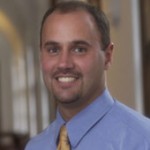 Professor Keith Bellizzi was interviewed for a story in the UK, “Masters of uncertainty: Pandemic’s unpredictability is making us adaptable, stronger and more creative, say experts”. Read the story here.
Professor Keith Bellizzi was interviewed for a story in the UK, “Masters of uncertainty: Pandemic’s unpredictability is making us adaptable, stronger and more creative, say experts”. Read the story here.
Rebecca Puhl featured in ConscienHealth article
 Professor Rebecca Puhl was featured in an article in ConscienHealth on Weight Stigma. Read the article here.
Professor Rebecca Puhl was featured in an article in ConscienHealth on Weight Stigma. Read the article here.
Alum Jennifer Cecarelli (’91) and her mobile bookstore business
 Alum Jennifer Cecarelli (’91) was recently featured in an article about her business, Peace, Love, Books! mobile bookstore, often seen in Hamden CT. Jennifer is also an elementary school teacher in Middletown, CT, and serves on the school board in North Haven.
Alum Jennifer Cecarelli (’91) was recently featured in an article about her business, Peace, Love, Books! mobile bookstore, often seen in Hamden CT. Jennifer is also an elementary school teacher in Middletown, CT, and serves on the school board in North Haven.
